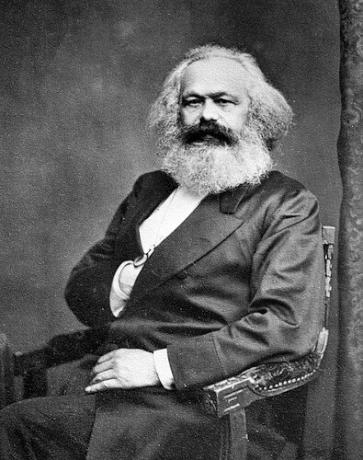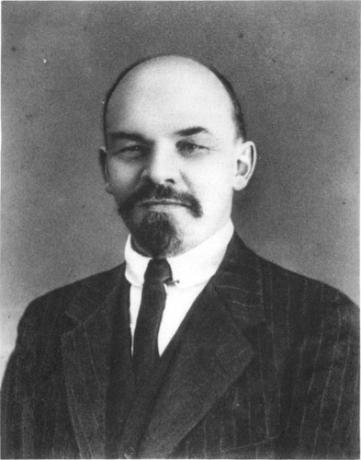O Marxism is a sociological, philosophical and political doctrine based on dialectical historical materialism and in thought socialist scientific created by Karl Marx and Friedrich Engels. These thinkers were responsible for economic and sociologically supporting the socialist ideas that already existed in Europe, in the nineteenth century, arising from anti-capitalist political theories that preached the need to think about a equal society.
Know more: Social inequality – the evil fought by Karl Marx
Characteristics of Marxism
The term “Marxism” was coined by thinkers after the Marx to refer to the set of ideas proposed by the author, that is, to designate the set of his work and his scientific socialist doctrine. At the end of the 19th century and beginning of the 20th century, Marxism spread in Europe, mainly on account of the socialist and socialist-oriented parties and trade unions. communist that emerged in the period, making a large part of the working class, also called the proletariat, to see the exploration situation where he lived.

The recognition of the exploitation suffered by the proletariat and caused by the bourgeoisie, the class that owns the means of production, was the main starting point of the Marxist analysis of society. Socialism, which was a doctrine politics prior to Marx, it already established the need to yearn for a society with greater equality, as the recent capitalism industrial was driving the working class into ever-increasing misery. What Engels and Marx did was an organized and systematic study of socialist thought to to develop a socialist economic theory that was applicable in practice..
In the realm of economics, the main features of Marxism are the prohibition of private property, and, consequently, the extinction of the bourgeoisie and the distinction of Social classes. And, according to Marx, this would be possible through a strong dictatorship that he called the dictatorship of the proletariat, which would take over the state and end all state and social structures that maintained the hegemonic power of the bourgeoisie in capitalist society: the bourgeois legal system, the economy based on private property, the bourgeois media and religion.
All these elements form sets that Marx called superstructure(State and capitalist legal system) and infrastructure(media and religion that create ideologies to keep the proletariat conformed to its exploitation).
In the field of politics, the main objective of Marxist theories is to promote the total fall of capitalism through a strong and oppressive socialist state against the bourgeoisie. Eliminating private property, the bourgeoisie and capitalism altogether, society would reach, according to Marxist theory, a full equality stage called communism.
In practice, throughout the story, we had attempts to apply Marxism, some more successful and some less. However, none was perfect to the point of arriving at the communist society imagined by Marx. On the other hand, we also had the capitalist resistance for the hegemony of the bourgeois power that repressed, in every way, any indication of what they called Marxist ideology.

O first great socialist experiment with a Marxist orientation was the foundation of Union of Soviet Socialist Republics (USSR), from the Russian revolution, in 1917, which went through the first command of Vladimir Lenin and was later taken over by the tyrant totalitarian Joseph Stalin.
The Soviet Union achieved a significant economic, industrial, scientific and technological power, making it stand out and leverage other countries, encouraging them to join a socialist government in the 20th century. Thus, Marxist socialism entered, through hard struggles, revolutions and coups, countries like the China, Cambodia, Vietnam and Cuba.
Read too: Totalitarian regimes – Stalinism was one of the representatives of this authoritarianism
The influence of Marxism on sociology
Karl Marx is considered one of the three classic sociologists, along with sociologists Emile Durkheim and Max Weber. More in line with capitalism, these two sociologists created grounded methods of social analysis. in elements dissolved in society, while Marx recognized that social analysis should start from relations between different social classes.
From then onwards he perceived a social class dispute in which one class (the bourgeoisie) exploited another class (the proletariat) in capitalist society. He also noted that this dispute was always present in other social models, grounding what led Marx to recognize the history of humanity as a historical social class struggle.
According to Marxist theory, the class struggle that makes up the history of humanity is a material struggle, based on production, and these findings led Marx to recognize that sociological analysis is a materialist and historical analysis, thus creating the concept of dialectical historical materialism.
The influence of Marxism on philosophy
THE philosophy, just like the sociology, was influenced by the thought of Karl Marx. O concept of dialectical historical materialism, for example, starts from an assumption of Hegel's philosophy, which goes back to a notion of dialectics extended from dialectics platonic. However, Platonic and Hegelian dialectics are ideal conceptions based on obtaining knowledge from contrary ideas.
Marx, who early in his career was an intellectual disciple of Hegel's ideas, subverted the philosophy of this idealist and failed to see sense in any kind of idealism that did not promote the social change. In this way, he came to understand that society should change and that any established philosophy should fight for social change. The dialectic would be, in this case, the expression of radical change in society from practical elements based on socialist equality.
Many later philosophers were influenced by Marx. We can highlight, as names who continued Marxist studies or who drew on Marxist philosophy to develop their own theories, philosophers of Frankfurt School, such as Adorno, Horkheimer and Marcuse; French existentialists, like Sartre and Simone de Beauvoir; philosophers called postmoderns or poststructuralists, such as Foucault and Deleuze.
Read too: Contemporary philosophy: philosophical period that received Marxist influence
What is cultural Marxism?
Marxism has always been frowned upon from the perspective of capitalist and conservative sectors of society, especially by some religious sectors. All over the world, an environment of “hunt” for communists and of people with any connection to Marxist thought at various times in history. Here in Brazil, we had the Communist Party's ban during the It was Vargas and during the military dictatorship, which started with a coup of State in 1964.
In order to establish a psychological terror environment, conservative sectors created a theory called cultural Marxism, considered by many to be false and ideological. Apparently, cultural Marxism does not exist, as it was just the idea of Marxist authors such as Italian philosopher Antonio Gramsci and German philosopher of the Frankfurt School Herbert Marcuse.
![Herbert Marcuse, one of the Frankfurt School philosophers who reinvented Marxism in the 20th century. [1]](/f/5fea34f3c96ddec3a993ac5c7b24277a.jpg)
According to these thinkers, the West was Christian and the only way to establish a communist society would be through the elimination of the hegemony of Christianity. According to conservatives, this elimination would occur through cultural attacks that would despise the values of the Christian family. However, neither Gramsci nor Marcuse thought of a way to apply cultural Marxism.
Even some right-wing, liberal and anti-Marxist thinkers point out that cultural Marxism is a kind of non-existent ghost used to attack left. One of them is Gary North, economist neoliberal and member of the Mises Institute, one of the research institutions on liberal economy, therefore from the right, with greater representation today.
According to North, cultural Marxism was established by Marcuse and Gramsci only in the field of ideas, being a subversion contrary to Marxism itself that requires a practical and material application. Therefore, there is no Marxist conspiracy aimed at implanting socialism through a cultural revolution.
Marxism in schools
Another recent debate on Marxism, also linked to the idea of cultural Marxism, refers to the Brazilian school environment. There is a indictment, also by conservative sectors, that universities promote an ideological indoctrination in undergraduate students, who will repeat such indoctrination in the classroom. This indoctrination would be Marxist-inspired and it would aim to overthrow the religious and capitalist structures, mainstays of conservatism, and would culminate in the spread of socialism in our society.
In response to such a movement, theoretically underway in Brazil since the end of the military dictatorship, in the 1980s, they were recently created movements against supposed indoctrinationMarxist, such as Escola Sem Partido, which presupposes an impartial education, without ideological bias.
Criticisms of those who defend the existence of a Marxist indoctrination in schools emphasize that any educational assumption based on equity of rights, whether social, political, gender or related to sexuality, it is a type of indoctrination Marxist.
There is also the pursuit of ideas from Marxist educational theorists (Most educational theorists and psychologists are Marxists), such as the Brazilian philosopher, writer and educator Paulo Freire, the french psychologist Jean Piaget or Russian psychologist Lev Vygotsky. With a more accurate analysis of what is at hand, it is clear that what they call Marxist indoctrination is, in fact, a defense of the human rights and, even more profoundly, the appreciation of teaching and teachers.
Marxism and Feminism
O feminist movement, which gained strength at the end of the 19th century, took some inspirations in Marxist ideas, although Marx did not directly theorize about female emancipation and gender equality. It turns out that the first wave of feminism was mainly supported by working-class women who wanted the same rights as men, such as less exhausting working hours and equal pay to perform activities equals.
From this strong mass that made up feminism, philosophers, like Rosa Luxemburg and, in the 1930s, in France, the existentialist Simone de Beauvoir, in addition to the Mexican painter Frida Kahlo based on Marxist ideals to guide their feminist theories. Just as Marxism preached the equality of social classes, Marxist feminists fought for gender equality through a kind of revolutionary struggle against patriarchal power that oppresses women.
Image credits
[1] Harold Marcuse/commons
by Francisco Porfirio
Sociology Professor
Source: Brazil School - https://brasilescola.uol.com.br/sociologia/conceitos-marxismo.htm
